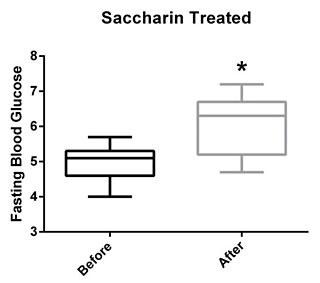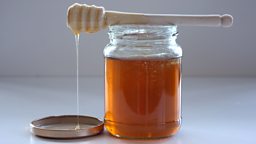Are artificial sweeteners bad for me?
When we reach for ‘diet’ or ‘low sugar’ products, we think that we’re choosing the healthy option: eating a lot of sugar can make our blood sugar levels high and put us at risk of Type 2 diabetes. But do artificial sweeteners actually help, or could they be doing us harm?

We teamed up with Dr James Brown at Aston University to find out.
Sweeteners such as saccharin, sucralose, aspartame and stevia are found in most low-sugar or ‘diet’ products, as well as many ‘normal sugar’ foods and drinks, so many of us are eating them without knowing it.
In 2014, a small study had shown that artificial sweeteners had disrupted the gut bacteria of mice, and when they tested saccharin on 7 people they found that it did the same to 4 of them, as well as making their blood sugar levels less healthy.
Many studies have also shown that people who take more artificial sweeteners tend to have a higher BMI and waist circumference, although it has never been shown that the sweeteners are actually causing them to put on weight.
So we wanted to do our own test, to confirm the findings in saccharin, but also test another, newer sweeteners, said to be more ‘natural’ as it is derived from a plant: Stevia.
The experiment
We recruited 15 volunteers, who did not normally consume artificial sweeteners. They all had their blood sugar levels measured (having fasted for 12 hours), and then were split into two groups. One group were asked to take the daily safe level of saccharin, and the other group the daily safe level of stevia for 7 days.
Each was also asked to give a stool sample, in order to analyse their gut bacteria.
At the end of the week, we did the same tests, to see what effect the two different sweeteners had had.
The results

We found that the blood sugar levels of the volunteers taking stevia had not changed significantly.

However, 4 of those who had taken saccharin had significantly higher blood sugar levels – meaning that the average of the group was overall significantly higher (p= 0.0293).
This raised blood sugar level is bad for their health, and means that in fact the saccharin, in a large proportion of people, is doing the opposite of what it promises. Far from protecting them from the bad effects of sugar, it is raising their blood sugar levels itself.
The results of the gut bacteria tests, analysed by Dr Paul Cotter of the Teagasc Food research institute, showed that those people who reacted to saccharin all had a similar bacterial composition to start with, and that they all changed in a similar way.
Meanwhile those who didn’t respond to the saccharin showed much less of a change.
Those taking stevia did see a bacterial change, but it was in the opposite direction from those who had a bad response to saccharin.
Conclusions
Although our study, and the one that preceded it, were both on small numbers of people, the consistent results – alongside the results found previously in mice – certainly suggest that saccharin is bad for some people, whilst we have no evidence that stevia is. The people whom saccharin tends to affect seem to be those with a specific gut bacteria composition, but there is no easy way to find out whether you are one of those people or not, so overall our advice has to be to avoid saccharin. The evidence in mice is that aspartame and sucralose may have a similar effect, but ours are the only results for stevia and they do not show a negative effect, so if you are looking for a sugar alternative then at the moment, stevia seems most likely to be the best out there. On the back of packaging it is sometimes called ‘steviol glycosides’, which are the sweet-tasting compounds in the Stevia plant.









































































